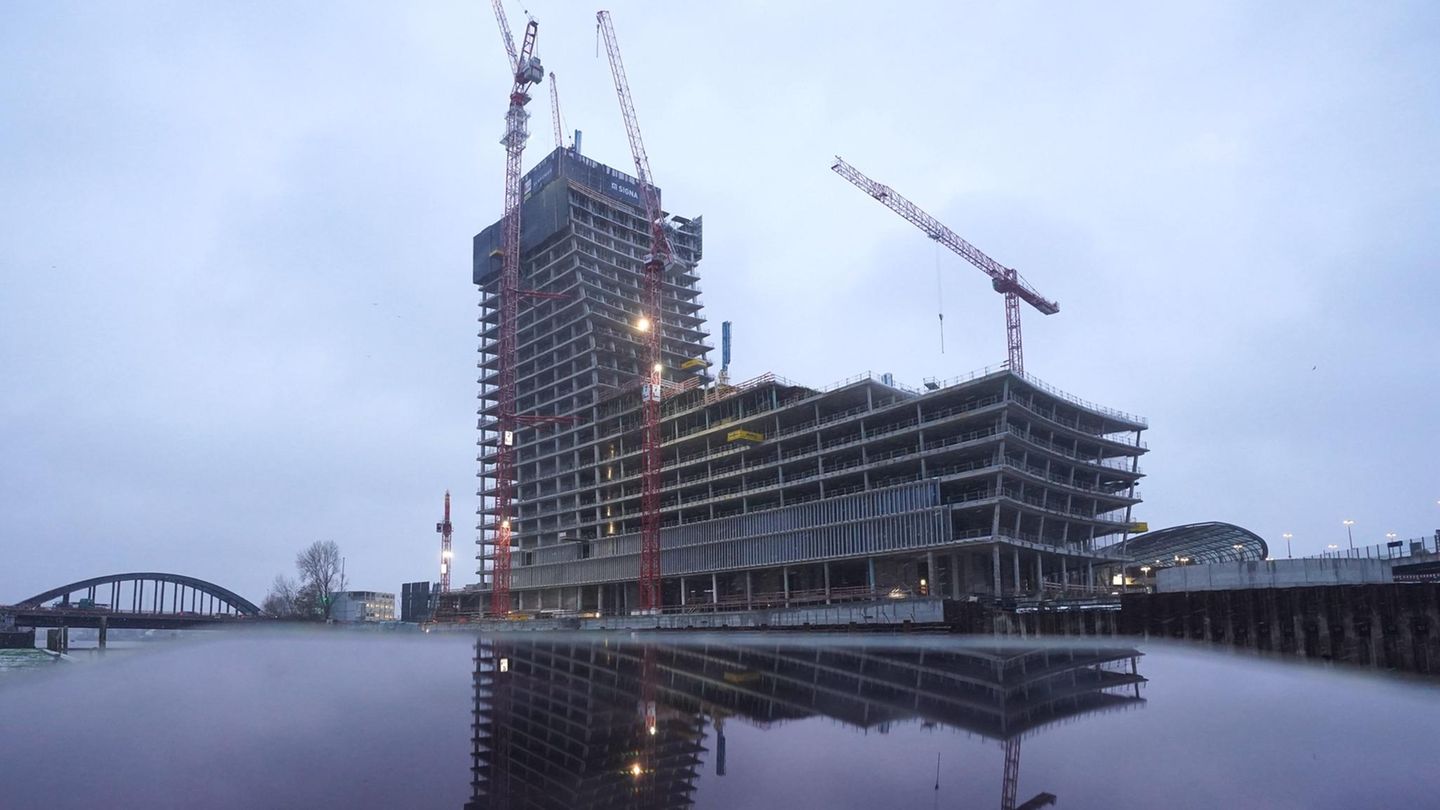After the insolvency of the flagship Elbtower project, the city of Hamburg wants to reverse the sale in an emergency and secure access to the half-finished building. But a look at the contract raises doubts as to whether a right of repurchase currently exists.
It seemed as if the Hamburg Senate wanted to announce the bad news itself – and combine it with a flight forward. Last Friday at 9:30 a.m., the Authority for Urban Development and Housing announced in a press release: The development company behind the Hamburg mega-project Elbtower had filed for insolvency. In the same announcement, urban development senator Karen Pein (SPD) announced that the Free and Hanseatic City could now “assert its right of repurchase secured by the purchase agreement as well as the takeover of all planning and construction contracts”. Your message: just don’t panic!
The Signa Group of the Austrian real estate investor René Benko transferred 122 million euros to the city for the building site. But in October it became known that work on the construction site for the 245-meter tower on the edge of Hafencity, which cost almost a billion euros, was on hold because Signa could no longer pay its bills. Since then, the Hamburg city government has been bringing up a possible retransfer of the area – including the stump of the tower, which already rises around 100 meters into the air.
It was always said that access to the project had been secured in the purchase agreement in case the client had problems, in order to dampen concerns that all that would remain of the great ambitions was an ugly ruined building. Mayor Peter Tschentscher (SPD) later added that in the event of a buyback, the city would only have to pay Benko’s group the purchase price without interest and less 5 million euros – even though Signa has already invested around 300 million euros in the construction work. Not a bad deal, even if the city would then have to take care of the project or resale itself.
What does the wording in the contract mean?
But a look at the purchase agreement dated February 6, 2018 for the prestige project, which was largely driven forward by Tschentscher’s predecessor Olaf Scholz (SPD), raises doubts about the official representation. The contract actually contains a clause for repurchase in the event of an “economic deterioration” of the situation at Signa’s subsidiary Signa Prime Selection, which acts as the buyer. The contract also clearly stipulates that “economic deterioration” includes the buyer’s insolvency.
However, the exact wording of the clause in paragraph 19.1.3 makes one suspicious. Because in the notarized version of the purchase contract it is stipulated – in somewhat clumsy language – as a prerequisite for the right to buy back: “Occurrence of an economic deterioration of the buyer (…) within” a certain period “after completion”. The exact deadline has been blacked out by the Hamburg authorities in the version of the document available to “Capital” (see excerpt). However, the wording “after completion” of the construction project, which defines the start of the period, is of crucial importance here.

However, the Elbtower is still miles away from completion – even the shell. Apparently the Hamburg Senate and its legal advisors from the high-end law firm Freshfields could not imagine that Benko’s conglomerate would slip into insolvency during the construction work. The mayor at the time, Scholz, praised Signa as an “outstanding real estate company”. Or the city and its lawyers were unable to secure such protection for the public sector in the negotiations with Signa. Instead, the contract only stipulates specific repurchase rights in the event that Signa breaks certain milestones in construction progress in the future. However, according to the contract, these do not take effect until the end of the decade – which is different from an immediate right of repurchase, which is triggered “immediately” by the developer’s bankruptcy, as urban development senator Pein explained.
Since the construction stop on the Elbtower in October and the start of the series of insolvencies in the Signa Group in November, the Senate’s lawyers have probably also dealt more intensively with the contract. In response to a request from “Capital” to the urban development authority and Mayor Tschentscher’s Senate Chancellery as to what contractual basis the Senate was relying on in its statements on the right of repurchase, a spokesman for Senator Pein referred to the already mentioned provision in paragraph 19.1.3. Accordingly, a repurchase is possible “from the time ownership of the property is transferred to the buyer up to one year after completion,” he explained. The wording “within” a certain period “after completion” in the wording of the provision refers “to the period between the transfer of ownership and one year after completion”. This interpretation also results from “the history of negotiations between the contracting parties,” assured the spokesman.
“Poor contract management”
Lawyers, on the other hand, emphasize that the wording is what matters when it comes to interpreting the contract. “According to the unambiguous wording of the clause, the right of repurchase should only arise after completion,” said Berlin lawyer Marc Liebscher, who specializes in capital markets and insolvency law. The Senate’s current argument that the wording in the contract actually refers to an earlier and longer period of time “seems more like a helpless attempt to cover up poor contract management in the past,” Liebscher added. This is also supported by the fact that the contract expressly defines further repurchase rights for reasons other than insolvency for a certain period of time “after the purchase property has been transferred” to Signa – and not just “after completion” of the project.
In order to avoid discussions or even legal disputes about the interpretation of the purchase contract with the insolvency administrator or other parties involved on Signa’s side, the Senate must now hope even more that a private buyer will be found to complete the project. But there is currently no interested party in sight. Billionaire Klaus-Michael Kühne, who has repeatedly been mentioned as a possible buyer and whose group is a shareholder in Benkos Signa Prime Selection, declined again on Friday.
Urban Development Senator Pein emphasized on Friday that the construction of the Elbtower was a “private sector project”. It is expected that “a private sector solution will be found as part of the insolvency proceedings for the prompt resumption of construction work.” However, the right of repurchase allows “the city to take control of the project if a viable solution is not found.” But lawyers might have to clarify whether it is actually that simple.
This article appeared first which, like stern, is part of RTL Germany.
Source: Stern




